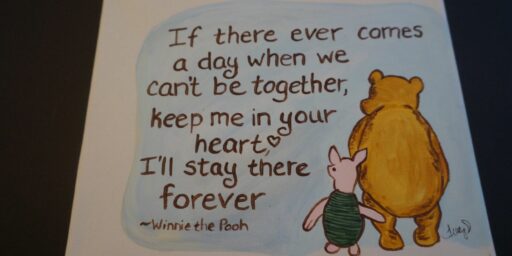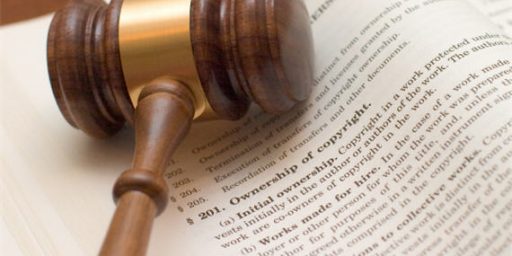Blogs and Fair Use Doctrine
Michael Bates, who runs a blog called BatesLine that specializes in coverage of the Tulsa, Oklahoma scene, has received a letter from the Tulsa World newspaper demanding that he cease and desist from quoting “in whole or in part” or even linking to material from its website and that he immediately remove any material from his archives that contain same.
Bates argues that,
excerpting copyrighted material for the purpose of criticism is covered by the fair use exemption, and linking to content cannot be a copyright violation because nothing is actually copied.
Scott Sala and Bob Owens concur and note, correctly I think, that this action will generate far more negative reaction to the Tulsa World than whatever Bates was possibly generating on his own.
The idea that providing a hyperlink to someone’s site (as opposed to hotlinking an image or other file on their server) infringes on a copyright or is otherwise problematic is absurd. I’m less sure, however, of the extent of the fair use doctrine. Certainly, excerpting a few sentences here and there for the purpose of commentary is protected. But what about whole paragraphs? Or what about posting the entirety of an article and having no commentary at all? What if the commentary goes no further than, “Heh”? And does it matter whether the material is available free to the public or only to paid subscribers? Does it matter whether the blog sells advertising and is thus a commercial enterprise?
17 U.S.C. § 107 , which sets forth the fair use exception, seems to suggest these things matter:
Notwithstanding the provisions of sections 106 and 106A, the fair use of a copyrighted work, including such use by reproduction in copies or phonorecords or by any other means specified by that section, for purposes such as criticism, comment, news reporting, teaching (including multiple copies for classroom use), scholarship, or research, is not an infringement of copyright. In determining whether the use made of a work in any particular case is a fair use the factors to be considered shall include—
(1) the purpose and character of the use, including whether such use is of a commercial nature or is for nonprofit educational purposes;
(2) the nature of the copyrighted work;
(3) the amount and substantiality of the portion used in relation to the copyrighted work as a whole; and
(4) the effect of the use upon the potential market for or value of the copyrighted work.The fact that a work is unpublished shall not itself bar a finding of fair use if such finding is made upon consideration of all the above factors.
I’ve seen discussion of these issues but do not know the extent to which they’ve been litigated. Presumably, though, differences in scale caused by new technologies or new applications of these technologies can change things. We’ve seen that, for example, with electronic file sharing.
Other discussion on the topic:
A Fair User’s Manual (Wired, Nov 2003) This piece examines the case law (not specific to blogging, though) and finds four basic questions that are at the heart of litigation:
- 1. Is the use transformative?
2. What’s the nature of the copyrighted work?
3. How much did you change?
4. What’s the effect on the market?
Jason Calacanis and J.D. Lasica discuss the use of others’ copyrighted photos on blogs.
Update (1455): Michelle Malkin links “14 Copyright Tips For Bloggers,” compiled from advice by Kimberlee Weatherall and Eugene Volokh.
Update (1605): IR below cites the Free Republic (1999) case. TechLaw Journal and Free Republic comment and supply facts on the case. The full text of the opinion is here. It does seem to establish, as seems reasonable enough, that merely cutting an pasting the entire article from a site without “transforming” it in some way through value-added analysis is a copyright violation. The judge ruled that the fact that readers might post comments later did not change the initial character of the posting.






Blogging, snippets, wholesale reproduct and fair use. Start here http://tinyurl.com/75jxqf
and here http://tinyurl.com/br47d6
I’m not sure what the Tulsa World is hoping to prove here, other than that they are feeling some kind of heat.
But there are four tests of the fair use doctrine, and I think it would be exceedingly difficult for the World to prove that Bates was violating fair use, especially if he isn’t in it for the money.
As far as I know, this hasn’t been litigated yet. I know that there have been cases where people were prohibited from posting entire articles on their sites (the names escape me), but a few paragraphs is not normally seen as fair use infringement. There were also a couple of cases in Europe that involved “deep linking” to pages without taking people through a main page, but I’m not sure the precedent.
I hope Bates finds some representation and takes this thing through the courts.
It is exceedingly shameful that a newspaper that relies on the first amendment to conduct its business chooses to waste its precious resources stanching the flow of information.
I was just talking the other day ( not on my blog) about how it is a matter of time before media and such strike back at blogs, this would seem to be a perfect angle.
Normally blogs go by the rule that if it is linked to, it is referenced and fair game, but I am sure that if we are forced to adapt to thinner lines we can do that with ease. perhaps that is why a bigger issue hasn’t been made of it yet.
I don’t see any problem with posting full paragraphs, and I think those who are linked to don’t mind either, after all even Instapundit readers don’t click the link ( and your readers don’t either) to see for themselves like they used to. Most of the time you have to post enough to get your reader to see why you’ve posted it. But that is a complicated matter of dealing with lazy passers by who may just not be interested in anything other than what is in front of them.
This sounds like a case of cutting off your own nose to spite someone. I would assume the Tusla World is interested in having traffic diverted to their site so people can see their products and their adverts. Well, if someone links you to their site then that’s a win-win for you, or so I would assume. I just don’t get what they’re so unhappy about.
It is exceedingly shameful that a newspaper that relies on the first amendment to conduct its business chooses to waste its precious resources stanching the flow of information.
They’re a “free press” when it suits them. When it doesn’t, they’re not.
On the flip side, I find it entirely likely that AP and other services will soon take note of some blogs’ wholesale appropriation of their photos. I’ve seen blogs that will run an AP, CNN, or other photo as part of a blog post … and I’m quite sure that “fair use” doesn’t cover that.
–|PW|–
First of all, Batesline is, without a doubt, a commercial operation.
The presence of “advertising space” on his blog confirms this. Additionally, any solicitation of donations would be defined as “commercial” as well. This issue has been decided on partial Summary Judgement (and stipulated to) in California Federal District Court (Washington Post/ LA Times v. Free Republic). Granted, Free Republic is a forum, and not a “blog,” but the decision holds true in both arenas. Judge Morrow made the ruling, which Free Republic stipulated to…based on quarterly donation requests. Interestingly, the Free Republic case was used to bury Napster.
Fair Use is, immediately, thrown out the window the minute the copyright abuser is confirmed to be a commercial entity that uses copyrighted material to further that financial status.
Also, Judge Morrow ruled that reproducing a full copyrighted piece v. an excerpt was not protected by Fair Use because there would have been alternatives such as excerpting, summarizing, or linking to the original piece. While the Tulsa World Newspaper is demanding a cease and desist on all excerpts and links in addition to full reproductions, they couldn’t enforce it on a non-commercial entity. However, Batesline has already failed the “non-commercial” litmus test…So, yes, they can require Bateline to comply and Fair Use would not save the blog.
Judge Morrow, also, found that the First Amendment is not a saving grace either. The Court stated that there were plenty of alternative to reproducing the entire copyrighted piece, and Free Republic did a piss poor job of showing the necessity of archiving such pieces (that happen to disappear from time to time on the original source’s server for whatever reason).
Personally, I think the Tulsa Paper is perfectly within their right to make these requests…simply because Batesline is a commercial entity. However, if Batesline pulls their ads, and doesn’t request donations…the game changes significantly.
Cheers
IR
IR,
Surely, Fair Use isn’t entirely vitiated in the case of a commerical enterprise. Indeed, journalists and other social critics use excerpts of otherwise copyrighted material all the time in pursuit of their trade. Nothing I’ve read indicates that “failing” prong one of the test nullifies the fair use exemption–it’s merely a factor.
I haven’t been at Free Republic in some time but seem to recall that they are mostly a clipping service with a comment/discussion board? That’s different than journalistic commentary.
Of course, you guys need to realize that this is the Tulsa World. You can’t read ANY articles on their website without being a paid subscriber. They’ve long been very head-in-the-sand and bass-ackwards about technology. Technologically, the Tribune was always ahead of them… part of the reason the World pulled the JOA in ’92 (that and the Tribune being a better paper with better writers).
There’s a political aspect to this C&D, but it’s much more about money, I reckon. The Daily Oklahoman is losing its “Joklahoman” status and finally emerging from Eddie Gaylord’s idiotic form of journalism. The Dallas Morning News has been making inroads into Oklahoma for years. The World’s answer has been to throw up as many walls as it can and hoard its money. It’s to the point that I don’t even know what’s going on in Tulsa anymore because The World has bottled up almost all the news coming out of there.
So, yes, it’s political, but not as much as you think. Tulsa is, with the exception of the black Northside and a few neighborhoods in Midtown, a very GOP town. The World used to be the “liberal” paper compared to the Tribune (a bit like calling Mr. Joyner a liberal compared to Ms. Malkin), but its been hard to the right since the mid-90s. The World is part of a cabal of conservative business men who are being opposed by a conservative cabal of businessmen and bloggers. But this is entirely about money.
Ok, so I might have been a bit overzealous by implying that commercial v. non-commercial is a mutual exclusive test…but, don’t kid yourself, it is the primary test, and ties in directly to the “nature of the copyrighted work.” Batesline is using the material to show the original source in a negative light. That, in turn, ties into the goal of Batesline to show a lesser value of the original work, which, arguably, can affect their bottom line. That’s three of the four right there. In the Free Republic case, the Wash Post/ LATimes were not required by Judge Morrow to present anything documenting that they lost revenue as a result of full copyrighted pieces being posted. She merely ruled in their favor.
You have another post today that implies that bloggers are journalists. Personally, I don’t think that’s true. Neither does the DOJ or the Texas Federal Court…Vanessa Legget found out the hard way that just writing about something doesn’t transfer the title of journalist to the author. I think she spent something like 200 days in prison in an attempt to use the 1st Amendment to protect her sources and work. And, I think Free Republic is very similar to the blog format. Articles are posted, viewers have the opportunity to comment. Arguing that that comments change the original piece into a transformative product has yet to be accepted. Using a excerpt by a bona fide journalist to enhance a piece of their own is defined as transformative as long as proper credit is applied.
With the only factor remaining of the four (amount and substantiality of the portion used) still undefined, I think the user is hard pressed to win a Fair Use defense when only meeting 25% of the burden. So, yeah, commercial v. non-commercial can be an all or nothing issue on Fair Use.
IR:
I think you’re misreading the FR case. There, they were simply cutting and pasting articles in their entirety with no transformation other than reader comments.
The fact that putting a MSM article in a bad light might discourage people from reading them isn’t a problem from a Fair Use standpoint. The issue there is whether having it available at FR would thereby diminish the likelihood of people visiting the originating site and thus their ad revenue and so forth.
Fair Use is an affirmative defense. That is, the one doing the using has to demonstrate that they are in compliance with the copyright law.
Anyone putting information out in the public arena is “press” and covered by the 1st Amendment. That includes gossip mags like the National Enquirer. No journalist, regardless of affiliation, has a right to shield his sources if there is a criminal investigation. That’s true of WaPo and Joe’s Blog.
IR:
“The Tonight Show” is a commercial venture, yes? Yet, Jay Leno regularly reads entire columns (usually short ones) on his show. And considering that sometimes he’s reading badly written head-lines, one can hardly argue that it is not showing off the item in a poor light.
Does this mean that “The Tonight Show” is violating “fair use”?
I’d say that spending time in jail protecting a source is a pretty good indication that said person is, indeed, a journalist.
Anyhow, journalists aren’t licensed (thank God), and no degree is required. Nor is it a status which can be conferred by a court. A journalist is someone who performs the act of doing journalism. One need not be paid, need not work for someone else, and need not be any good.
This has no bearing on fair use. The right to free speech means I have as much right as the New York Times to excerpt and critique any copyrighted work.
Similarly, an individual doesn’t need to be connected to an educational institution in order for their use to be of an educational nature. A company might photocopy a newspaper article and post it in the breakroom, or a non-profit may photocopy part of an article and slip it under your door. Or, a blogger might use a snippet of copyrighted to draw attention to a person, issue or event.
IR, in re: Bloggers as journalists.
The quesiton was actually addressed as part of Tuesday’s DC Circuit ruling that reporters Judith Miller and Matthew Cooper have no First Amendment (or related common-law) privilege not to testify in the Plame investigation:
(Kerr’s post also cites a New York Times oped by Eugene Volokh that argues that bloggers should be considered journalists under the law.)